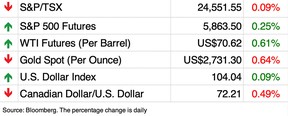Economy shooting off too many troubling flares for this pair of prognosticators

Article content

A couple of well-known economists are predicting the Bank of Canada will end up cutting interest rates lower than many have forecast as weakness in the economy continues to accumulate.
Wednesday’s jumbo-sized 50-basis-point cut left the central bank’s benchmark lending rate at 3.75 per cent, still well above the 2.25 per cent to 3.25 per cent range for its neutral rate, which is where the cost to borrow neither speeds up nor slows down the economy.
Advertisement 2
Article content
But with the economy shooting off troubling flares in different areas, economists at Rosenberg Research & Associates Inc. and Royal Bank of Canada are calling for interest rates to fall to two per cent or even lower by the middle of next year as policymakers respond to those emergency signals.
“A policy rate above the neutral rate is totally incongruent for an economy in a state of lingering excess supply,” David Rosenberg, founder of Rosenberg Research, said in a note on the Bank of Canada’s rate cut. “Such a condition augurs for a rate no higher than two per cent, and quite possibly lower.”
Claire Fan, an economist at Royal Bank of Canada, echoed Rosenberg’s assessment that this rate-cutting cycle should end at two per cent given the building signs of stress in the economy.
“In terms of the terminal level of interest rates, we think the BoC will cut to two per cent by July next year, stimulative and a touch below the lower bound of the (Bank of Canada’s) own estimates of (a) neutral rate at 2.25 per cent to 3.25 per cent,” she said in a note on Wednesday.
Among the other Big Six banks, terminal rate forecasts range from 2.25 per cent at Toronto-Dominion Bank and Canadian Imperial Bank of Commerce to 2.5 per cent at the Bank of Montreal to three per cent at the Bank of Nova Scotia. The latter forecast is more in line with current market predictions for a terminal rate of 2.75 per cent to three per cent, according to Bloomberg data.
Article content
Advertisement 3
Article content
So what are the economic stressors pushing Rosenberg and Fan into outlier territory?
Fan at RBC is calling for gross domestic product (GDP) growth of 1.3 per cent in 2025, well below the Bank of Canada’s fresh forecast in the latest Monetary Policy Report of 2.1 per cent. For this year, RBC expects GDP to come in at approximately one per cent while the central bank has it at 1.5 per cent.
Canada’s largest bank also expects the unemployment rate to rise to seven per cent “in the coming quarters and for softening activities combined to bring more disinflationary pressures in 2025,” Fan said.
The unemployment rate is currently 6.5 per cent.
Rosenberg’s economic red flags include the ongoing reference in several Bank of Canada statements, including Wednesday’s, about “excess supply” in the economy, which indicates more is being produced than consumed. Policymakers said they expect that condition to persist into 2026.
“When we model this situation out, it implies a peak unemployment rate of eight per cent this cycle and a zero per cent inflation rate from 1.6 per cent currently and light years away from the 8.1 per cent cycle peak,” he said.
Advertisement 4
Article content
Rosenberg noted that pre-COVID-19, the interest rate was 1.75 per cent and there was no “disinflationary output gap” of the economy producing less than it can, while GDP and inflation were lower, but unemployment was higher.
“The path of future rate cuts may be open for debate,” he said. “But the destination is not.”
Sign up here to get Posthaste delivered straight to your inbox.

A reduction was on the cards, but not many expected a reduction of about 21 per cent to 395,000 newcomers in 2025 and 380,000 in 2026. The target for 2024 was about 485,000.
The targets have generally been maintained or increased for more than a decade, but the federal government decided to go against the trend due to declining job vacancies, rising unemployment — especially among newcomers and younger people — and growing concerns about affordability. — Naimul Karim, Financial Post
- Bank of Canada governor Tiff Macklem is expected to speak to reporters at 2:30 p.m. ET while attending the IMF and World Bank annual meeting in Washington, D.C.
- Today’s data: Statistics Canada releases retail sales for August.
- Earnings: Colgate-Palmolive Co., Canada JetLines Operations Ltd., Corus Entertainment Inc., Tamarack Valley Energy Ltd., Taiga Motors Corp.
Advertisement 5
Article content

If you filled in your email address on the front page of your T1 personal tax return, you have officially registered to receive most Canada Revenue Agency communications via email. This means the onus is on you. If you forget to check your email and miss an important communication, it could end up costing, warns tax expert Jamie Golombek. Find out more here.
Hard Earned Truths
In an ongoing series about what the next generation needs to know to build wealth, we offer hard earned truth #3: These are the five cognitive biases that you should fear most.
McLister on mortgages
Want to learn more about mortgages? Mortgage strategist Robert McLister’s Financial Post column can help navigate the complex sector, from the latest trends to financing opportunities you won’t want to miss. Read them here
Financial Post on YouTube
Visit Financial Post’s YouTube channel for interviews with Canada’s leading experts in economics, housing, the energy sector and more.
Today’s Posthaste was written by Gigi Suhanic, with additional reporting from Financial Post staff, The Canadian Press and Bloomberg.
Have a story idea, pitch, embargoed report, or a suggestion for this newsletter? Email us at posthaste@postmedia.com.
Bookmark our website and support our journalism: Don’t miss the business news you need to know — add financialpost.com to your bookmarks and sign up for our newsletters here.
Article content









